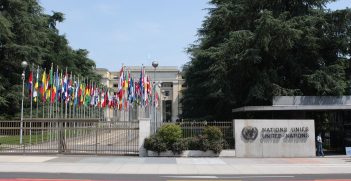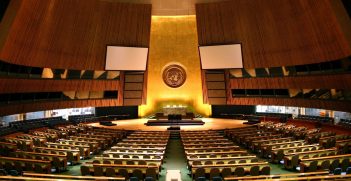Lessons from the Global Financial Crisis

This month marks the tenth anniversary of the full outbreak of what would come to be known as the global financial and economic crisis. What have we learned?
This month marks the tenth anniversary of the full outbreak of what would come to be known as the global financial and economic crisis, or GFC for short. This was the greatest economic stress test since the Great Depression of the 1920s and 1930s, and the greatest challenge to social and political systems since the Second World War. It not only put financial markets and currencies at risk; entire economies and political systems were threatened as the crisis quickly revealed major regulatory shortcomings and weaknesses in governance capacity at all levels.
Even though the GFC was felt almost worldwide, its severity and nature varied significantly across countries. They range from protracted crisis countries such as Greece, Italy, and Portugal which experienced multiple crises, to rebounded countries such as Iceland, Ireland, and Estonia that were hit early and hard, but found relatively stable routes to recovery; to debt crisis countries such as Japan, the UK, and the US that essentially borrowed their way out of the GFC; to largely unaffected countries such as Australia, China, and India. Most of the countries impacted by the GFC have since recovered economically, but traces of it still remain to varying degrees in terms of high public debt burdens, distrust in many institutions, including political elites, as well as other aspects.
Now ten years on, we offer an opportunity to tease out the implications of the GFC for governance today and consider how such financial and other global crises of similar magnitude and complexity can be prevented or better managed in the future.
Five lessons
Lesson 1: When regulatory and other governance tasks are not clearly assigned or are fragmented among various institutions, it may be difficult to prevent crises and may make them harder to manage when they occur. For example, once massive public monies were committed to rescuing private and public financial actors, it was unclear who was in control of processes and funds. Fuzziness of the regulatory framework in place invites gaming, shirking, and blaming—the characteristic deficiencies associated with overly complex but underspecified regulatory regimes.
Lesson 2: Policy fields become crisis-prone when they develop in such a way that national regulation can no longer provide sufficient oversight, but international regulatory systems remain inadequate, as happened with international finance before the GFC. Such a decoupling creates inherent governance weakness or institutional voids in which rules on a global scale are either declining or lacking and in which public agencies are absent.
Lesson 3: Major technological advances can lead to rapid changes in markets that can outpace institutional changes in policy fields. For example, new markets can emerge that offer huge pay-offs for early adopters or investors. These market actors not only outpace but frequently also outwit national and international regulators trying to fill the institutional void.
Lesson 4: There is a need for relatively independent actors in fields that are decoupled, as international finance was decoupled from regulatory oversight before the GFC, or as other fields such as cyber-related technologies are in the process of becoming so. Without a countervailing public including watchdog groups, think tanks, activists and the like demanding transparency and accountability, the influence of private actors on legislation and regulation may remain largely uncontested, leading to normative voids.
Lesson 5: Stricter sanctions should be applied more quickly and more comprehensively to help restore trust in institutions, mainly on the part of citizens. Holding accountable those most responsible for a crisis helps minimise damage to the legitimacy of the entire system.
Other lessons: crisis avoidance and preparedness
- Strengthen analytical capacity wisely. Continued efforts to strengthen analytical capacity within and outside government are essential, but at least as important is determining which skills and tools are required to foresee and prevent such crises and manage them when they occur. Running crisis scenarios and having emergency plans ready, as some countries such as Australia did, are examples. Such exercises should be conducted and plans be drawn up for all policy fields showing signs of decoupling and the development of institutional voids. In addition, measures should be taken to maintain a diverse and complex set of institutional actors that support and pursue evidence-based policy-making in all sectors of modern economies.
- Manage debt now. Government debt levels are clearly much higher than before the GFC across advanced industrialised economies on average. The debate about austerity focuses correctly on whether there should be any spending cuts or tax increases when the economy is already weak. But most economies in mid-2018 are relatively strong. This offers governments the opportunity to consolidate and reduce debt burdens so that they have the ability to react with more debt (or less austerity) when the next economic downturn or crisis occurs.
- Prepare systematic assessment of multilateral governance. Such an assessment would help categorise the problems facing existing arrangements; identify underlying interactions and structures; establish who, how many, and how diverse the relevant players are; and, on this basis, determine the effectiveness of the enforcement and monitoring mechanisms they rely on. This research should help map a limited set of governance templates onto a limited set of collective action games and a wider set of concrete international cooperation issues. The result would give actors a set of clear choices to guide them in solving global problems, preferably before they turn into crises.
The global financial and economic crisis, now ten years past, has taught us that we are not yet very good at handling crises quickly, especially those stemming from the conflicts and tensions arising with decoupled fields and institutional voids. While we can point to some improvements in preparing for and managing crises, we now need to become more alert to policy fields and developments that are on the verge of escaping the governance capacities of national and international institutions and which face few countervailing forces. Among these fields and developments we list migration, trade, cyberspace and climate change, as well as rising nationalism and a growing disregard for science and fact-based policy-making. They are the harbingers of futures crises, just as global finance was and to some extent continues to be.
The Hertie School of Governance is a private university based in Berlin, Germany, accredited by the State and the German Science Council. Interdisciplinary and practice-oriented teaching, first-class research, and an extensive international network set the Hertie School apart and position it as an ambassador of good governance, characterised by public debate and engagement. The School was founded in 2003 as a project of the Hertie Foundation, which remains its major partner.
Regina A. List is Managing Editor of The Governance Report at the Hertie School of Governance.
Sonja Kaufmann was Associate Editor of The Governance Report at the Hertie School of Governance.
Helmut K. Anheier is Professor of Sociology at the Hertie School of Governance.
Luciana Cingolani is Assistant Professor for Public Administration at the Hertie School of Governance.
Mark Hallerberg is Dean of Research and Faculty and Professor of Public Management and Political Economy at the Hertie School of Governance.
Jean Pisani-Ferry is Senior Professor of Economics and Public Management at the Hertie School of Governance.
Kai Wegrich is Professor of Public Administration and Public Policy at the Hertie School of Governance.
Sebastian Ziaja is a postdoctoral researcher at the Research Center for Distributional Conflict and Globalization in Heidelberg University and the lead data analyst for the Hertie School of Governance’s Governance Report 2018.
This article is an extract of the executive summary of Hertie School of Governance’s ‘The Governance Report 2018’.
This article is published under a Creative Commons Licence and may be republished with attribution.





